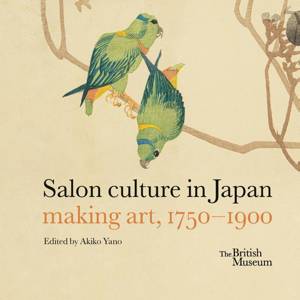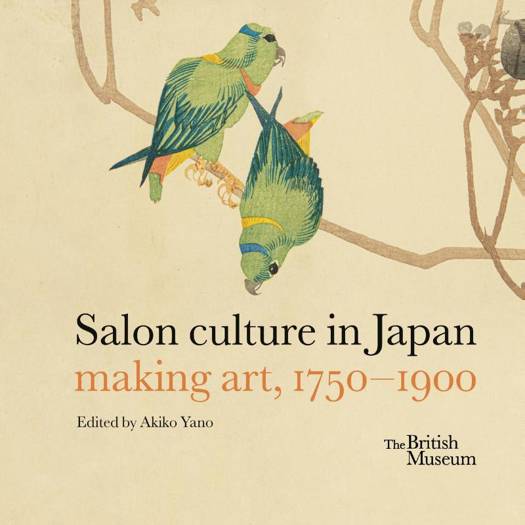
Bedankt voor het vertrouwen het afgelopen jaar! Om jou te bedanken bieden we GRATIS verzending (in België) aan op alles gedurende de hele maand januari.
- Afhalen na 1 uur in een winkel met voorraad
- In januari gratis thuislevering in België
- Ruim aanbod met 7 miljoen producten
Bedankt voor het vertrouwen het afgelopen jaar! Om jou te bedanken bieden we GRATIS verzending (in België) aan op alles gedurende de hele maand januari.
- Afhalen na 1 uur in een winkel met voorraad
- In januari gratis thuislevering in België
- Ruim aanbod met 7 miljoen producten
Zoeken
Salon culture in Japan
making art, 1750-1900
Akiko Yano, Alfred Haft, Rosina Buckland
Hardcover | Engels
€ 41,95
+ 83 punten
Omschrijving
The first publication to celebrate the British Museum’s rich collection of these technically sophisticated artworks created as part of Japanese cultural salons in the late 18th and 19th centuries, featuring lively figures in daily life and festivals, elegant birds and flowers, ferocious animals and lyrical landscapes.
Cultural salons were creative spaces for people of all social levels to jointly pursue painting, poetry and other artistic endeavours. Many people today think of artists and poets as professionals or specially gifted. In early modern Japan, however, large numbers of people joined cultural activity groups to pursue diverse kinds of arts as serious but amateur practitioners. With a variety of motivations, people from all walks of life – young and old, women and men – participated enthusiastically in these circles. Everyone used a pen- or art-name. Individuals were therefore able to socialise and interact broadly through these artistic activities, regardless of official social status as regulated by the shogunal government. In the area around Kyoto and Osaka especially, the idea of communal and collaborative creativity seems to have been deeply engrained. Each of the two cities, located close to each other but geographically remote from Edo (modern-day Tokyo), the seat of the shogun’s government, had a distinct character: Kyoto, the national capital where the emperor and aristocrats resided, and Osaka, the centre of commerce.
Only a fraction of these technically sophisticated artworks has previously been published in colour. With six essays by leading experts that explore this fascinating cultural phenomenon from different angles, and eight shorter insights that delve into specific historical aspects and the personal connections and legacies of cultural figures, this book offers a new perspective on Japanese art and society in the late 18th and 19th centuries.
Cultural salons were creative spaces for people of all social levels to jointly pursue painting, poetry and other artistic endeavours. Many people today think of artists and poets as professionals or specially gifted. In early modern Japan, however, large numbers of people joined cultural activity groups to pursue diverse kinds of arts as serious but amateur practitioners. With a variety of motivations, people from all walks of life – young and old, women and men – participated enthusiastically in these circles. Everyone used a pen- or art-name. Individuals were therefore able to socialise and interact broadly through these artistic activities, regardless of official social status as regulated by the shogunal government. In the area around Kyoto and Osaka especially, the idea of communal and collaborative creativity seems to have been deeply engrained. Each of the two cities, located close to each other but geographically remote from Edo (modern-day Tokyo), the seat of the shogun’s government, had a distinct character: Kyoto, the national capital where the emperor and aristocrats resided, and Osaka, the centre of commerce.
Only a fraction of these technically sophisticated artworks has previously been published in colour. With six essays by leading experts that explore this fascinating cultural phenomenon from different angles, and eight shorter insights that delve into specific historical aspects and the personal connections and legacies of cultural figures, this book offers a new perspective on Japanese art and society in the late 18th and 19th centuries.
Specificaties
Betrokkenen
- Auteur(s):
- Uitgeverij:
Inhoud
- Aantal bladzijden:
- 256
- Taal:
- Engels
Eigenschappen
- Productcode (EAN):
- 9780714124964
- Verschijningsdatum:
- 6/06/2024
- Uitvoering:
- Hardcover
- Afmetingen:
- 257 mm x 258 mm
- Gewicht:
- 1554 g

Alleen bij Standaard Boekhandel
+ 83 punten op je klantenkaart van Standaard Boekhandel
Beoordelingen
We publiceren alleen reviews die voldoen aan de voorwaarden voor reviews. Bekijk onze voorwaarden voor reviews.









